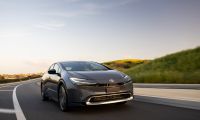If the early adopters of electric cars are quickly being sold their electric car, who will make the next wave of electric car purchases? The early followers, or those who are the most influenced by early adopters to buy electric cars. There is a list of common ideas around electric cars that need to be answered for the early followers to grasp, and see that the water is fine, or that maybe next years models will be good enough for them.
Too expensive: The up-front purchase cost of electric cars is clearly more than for the equivalent gasoline car. There are several counter points to consider. The most clear point is that the operational cost for an electric car is much less than the operational cost for a gas car. Electricity, as a fuel, is much cheaper than gasoline, and electric cars require much less maintenance. There's also an altruistic goal that will appeal to some, that buying an electric car encourages the car companies to manufacture more electric cars, increases electric car production volume, and if enough do so economies of scale should bring down the cost.
Limited range: Today's electric cars offer a 100 mile or so range, and the automotive style to which we've become accustomed is the illusion of infinite range that's available at the corner gas station. Electric cars simply do not provide that experience today, but is that a reason to discount them? First, understand your real driving needs, and choose a car to fit those needs. The majority of people drive 40 miles or less per day, making electric cars quite suitable for most people.
With most electric cars the long road trip isn't practical, so do not drive the electric car on long trips, yet. Most families own two or more cars, and could have one electric car and one gas car they use on long trips. Alternatively, the Chevy Volt is a quite fine plug-in hybrid with a 40 mile or so electric range, and many Volt owners are driving all electric the vast majority of the time, visiting the gasoline station every couple months or so.
Some people honestly do have daily long range drives, for example the sales or service people are out in the field every day all day long.
It takes too long to charge: The key thing to satisfy common longer range driving needs is a robust public charging infrastructure, especially public fast charging stations. Fast charging stations refill the battery pack at the rate of 160 miles per hour of charging (or more), but fast charging stations are only now beginning to be installed in the public in Chicago, the SF Bay Area, and other parts of California. Unfortunately there is a political battle brewing around fast charging standards, that could delay deployment of fast charging stations.
Currently charging stations (fast or not) are being built in urban areas. This is a necessary phase that will make each city a comfortable place to drive an electric car. The next phase will be fast charging stations along the highways between major metropolitan areas, to support long range trips.
Also consider the charging rate of the built-in charger on the car. Some have 3.3 kilowatt chargers on-board, which just is not a very fast charge rate (12 miles per hour of charging). Some electric cars, especially in the 2013 model year, have 6.6 kilowatt chargers, which give 25ish miles of range per hour of charging. The J1772 connector is designed to accommodate a 19.2 kilowatt charging rate, and if that is ever fully exploited would place the charging rate at the low end of the fast charging protocols.
The key point to understand is that the faster the charging rate, the more flexibly you can drive your electric car, and the farther you can drive in a day.
Where to charge? Can't charge at home or work? If the solution for limited range is a public charging infrastructure, its necessary to know where that infrastructure is. It's not like the infrastructure is as ubiquitous as gasoline stations. Fortunately we're not stuck blindly driving around hoping to accidentally bump into a charging station. There are a range of smart phone applications like Recargo, or PlugShare, or CarStations and the like which displays charging station information on a browseable map. Additionally the electric cars tend to have in-dash infotainment systems that include a browseable map of nearby stations.
Some will be unable to install a charging station at their home, or their employers aren't enlightened enough to install charging stations at the office. Those are expected to be the two most common places to charge an electric car, at home or the office. Employers could take an attitude that providing electric car charging facilities is a "perk" that is unfair to the employees who do not own electric cars. While this has some validity, the ChargePoint network (Coulomb Technologies) gives an employer the ability to pass along the costs to the employees who use the charging stations.
The inability to install a station at home is a little more intractable. Some electric car owners skip installing an official charging station at home, and instead use the 120 volt charger supplied with the car. A knotty problem policy makers are working on today is those who live in "multi family dwellings" (condominiums, townhouses, apartments) because it is up to the landlord or home owners association. Landlords and HOA's can be difficult to convince to provide charging stations.
You mean I need to spend $2000 or more on a charging dock? The retail price for charging stations is $800 or more, and in most cases must be installed by a certified electrician, and maybe go through curious legal hoops like permits from the city. One hopes the cost for home charging stations will drop over time. In the mean time, some are getting along well enough with the 120 volt charger that comes with the car.
Current gas car works, don't need a new car: Each person has their own schedule for buying and replacing cars. It's a valid consideration to make, because the car you already own has an embedded energy cost and buying a new car carries with it a new embedded energy cost burden. In the bigger scheme of things, there is a huge environmental and economic benefit if you can make your car purchase last for as many years as possible.
Are you real anxious and excited to own an electric car? Go for it. Are you content to wait until you would normally replace your car? That's a perfectly valid choice as well.
How long do batteries last? Aren't they expensive to replace? Non-recyclable? Toxic side effects? The electric car manufacturers give extra long warranties on the battery pack, 8 and sometimes 10 years. Essentially that's a bet by the manufacturer that the battery pack will last the lifetime of the car. At today's prices battery packs are expensive, but the history of battery packs is every year they get a little cheaper, and can pack a little more energy. Every so often there are dramatic jumps where the cost is dramatically less, and the battery carries dramatically more energy.
It's thought that lithium ion battery packs are extremely recyclable, but that there haven't yet been enough sold to warrant building an industry of recycling factories. In a few years as the current wave of electric vehicle's begin to wear out, there will be a large enough stock of electric cars heading to car recycling yards to warrant building recycling factories.
The chemicals going into lithium ion battery packs are generally clean, however there are some toxic chemicals used in some processes. One of these is n-methyl pyrollidone (NMP) which was only recently identified as a reproductive toxicant, that is absorbed through skin and air. It is used in some steps of lithium ion battery production, as well as other industrial processes, and removed by the time a lithium ion battery pack is manufactured into a car. Governments are increasing regulatory scrutiny of NMP. Some battery makers, like Electrovaya, have other processes that do not require NMP.
Don't like change: Our society has 100+ years of history of using gasoline powered cars, meaning that it will not be simple to switch away from the gasoline station traditions to new ones. At the same time humans are resilient, and can change, if they see the need or ability to do so. In a year or two we should expect it to be easier to switch, as the purchase price drops, the range increases, and there is a better charging station infrastructure.
As the Buddha taught a few thousands of years ago, the only constant thing in the universe is that everything changes, and nothing is permanent. Our society changed from horse and buggy to internal combustion cars, our society can change again.
Set Torque News as Preferred Source on Google











Comments
It's all well and good to
Permalink
It's all well and good to point out the few negative aspects of an EV, but the bottom line is the feedback from those who drive them now. The Volt and LEAF are the highest rated vehicles in history based on consumer satisfaction. There is a reason for this. Actually, many reasons, and they all have something to do with the three main benefits of EVs: Much less impact on the environment; Beneficial to our economy; Good for our national security.
Any meaningful conversation with a LEAF or Volt owner will leave rational people knowing that plug-in cars are superior to ICE and that's just a matter of time before everyone drives them.
To Mr. Scotts Point: Rational
Permalink
In reply to It's all well and good to by Paul Scott (not verified)
To Mr. Scotts Point: Rational People is the key. There is a whole segment of the population who have had their mind made up by, of all things, those on the conservative right. If any group of people should be jumping up and down at Americans to buy a Volt it should be our conservative leaders.
Points for the Conservatives:
If every American owned a Volt we could fire OPEC. Even drivers that commute 80 miles a day would use 50% less gas. That's enough to stop buying oil from them.
We stop sending money to countries that support terrorism
We stop giving away 7 Billion Dollars to Big Oil for Foreign Tax Credits and other subsidies (some re-election coffers will suffer on both sides of the aisle)
Our nation is more secure and our troops have no more interests to protect in the Middle East
America needs something, anything, to export and we can be the leaders in this new technology
Jobs AND the Economy
Just a few idiots in the conservative media have steered the whole flock wrong. Big oil wields big re-election and advertising dollars. The only conservatives or liberals for that matter that would degrade the technology of the Volt are those that are selling us out as a country.
Please don't forget the
Permalink
In reply to It's all well and good to by Paul Scott (not verified)
Please don't forget the Toyota Prius Plug-in! The Prius has been around for more than ten years now and this newest iteration, the Plug-in, is the best vehicle that I have ever owned in my 45 years of automobile ownership. We traded in our 2010 Prius for this Plug-in third generation Prius and we are consistently getting over 60 MPG even on our 250 mile trips to the Bay Area. Around town we routinely see 85 MPG or more. I look forward to the evolution of the Chevy Volt but at this time the Toyota Prius Plug-in is a time-proven alternative to gas-only vehicles and in HV mode (after the electric charge is depleted) the Prius is the cleanest car on the road!
To keep credibility, we must
Permalink
To keep credibility, we must be careful how we answer questions as well as the facts we present. Electric cars are only ready for a niche market today, and as much as I would like to see them catch on we can do more damage than good if we try to convince people that EVs are right for them when they’re not.
Examples: in the “Too expensive” category – the relatively few electric cars on the road today have not yet provided enough data to support the assumption that “the operational cost for an electric car is much less than the operational cost for a gas car.” It is true that fuel costs are cheaper, but maintenance and repair costs are not proven. We should point out that maintenance costs could be lower due to fewer moving parts, but at the same time we should acknowledge that EVs have more complex electronics than ICE cars and could require more expensive service since fewer technicians have the training to work on them.
“Limited range”: I agree that people need to evaluate just how much range they truly need, but “40 mile or so” is not realistic for many people. Range is also shortened by topology, road speeds, weather, and battery age. Don’t assume that a finite number (like 40 miles) makes EVs practical for “the majority of people”.
“It takes too long to charge”: don’t forget that fast charging can significantly shorten battery life. Until battery replacement cost come down this can be a significant concern. However, many EV drivers may find that they do not need full charges every time.
Anyway, overall I love your approach. Just be careful not to promise too much too quickly.